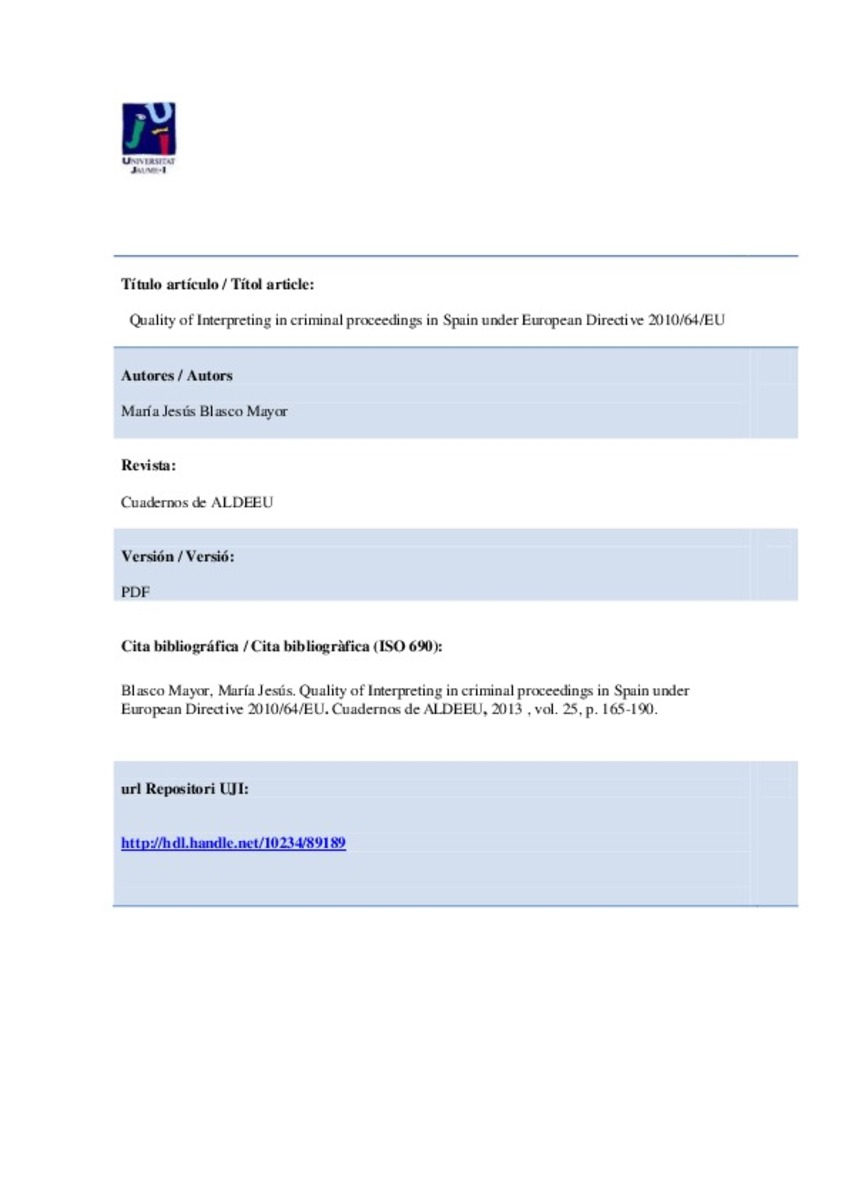Mostrar el registro sencillo del ítem
Quality of Interpreting in criminal proceedings in Spain under European Directive 2010/64/EU
| dc.contributor.author | Blasco Mayor, María Jesús | |
| dc.date.accessioned | 2014-04-01T15:16:22Z | |
| dc.date.available | 2014-04-01T15:16:22Z | |
| dc.date.issued | 2013 | |
| dc.identifier.issn | 0740-0632 | |
| dc.identifier.uri | http://hdl.handle.net/10234/89189 | |
| dc.description.abstract | In spite of the proliferation of translation and interpreting degrees in Spanish universities, most court and police interpreting is not carried out by translation and interpreting graduates. This is due to various factors, including the tensions amongst the different legal interpreting (LI) stakeholders—certified LIs, court LIs ; low socioprofessional recognition of court interpreters—often lower than that of unskilled workers and the lack of specific legal interpreting training, due to the foregoing. These conditions have long created a vicious circle. Under the new European Directive1 that has just come into force, and which will have to be transposed to their jurisdictions by European member states by October 2013, every defendant has a right to good quality interpreting. Therefore both the working conditions and the training of interpreters will have to undergo radical transformations in Spain in order to meet the standards set by the Directive, such as the creation of a national register, or perhaps national and regional registers of certified interpreters, and the adoption of a code of conduct. At the same time, the social and professional status and role of legal interpreters in Spain is in need of an urgent update considering the ongoing changes in the situation. Up to now, the system has been dominated by outsourcing of court interpreting services in most Spanish regions. This paper addresses these issues in the light of a number of initiatives that have come from different stakeholders regarding the professional regulation that is needed in the Spanish legal context. The hope is that such initiatives will contribute to a win-win situation for all parties and eliminate unfair practices. | ca_CA |
| dc.format.extent | 25 p. | ca_CA |
| dc.format.mimetype | application/pdf | ca_CA |
| dc.language.iso | eng | ca_CA |
| dc.publisher | ALDEEU - Spanish Professionals in America | ca_CA |
| dc.relation.isPartOf | Cuadernos de ALDEEU, 2013, vol. 25 | |
| dc.rights | ©ALDEEU-Spanish Professionals in America, Inc., 2013 | ca_CA |
| dc.rights | Attribution-NonCommercial-ShareAlike 4.0 Spain | * |
| dc.rights.uri | http://creativecommons.org/licenses/by-nc-sa/4.0/ | * |
| dc.subject | Legal interpreting | ca_CA |
| dc.subject | European Directive | ca_CA |
| dc.subject | Transposition | ca_CA |
| dc.subject | Training | ca_CA |
| dc.subject | Professionalization | ca_CA |
| dc.title | Quality of Interpreting in criminal proceedings in Spain under European Directive 2010/64/EU | ca_CA |
| dc.type | info:eu-repo/semantics/article | ca_CA |
| dc.rights.accessRights | info:eu-repo/semantics/openAccess | ca_CA |
| dc.relation.publisherVersion | http://aldeeu.org/cuadernos/index.php/CALDEEEU/article/view/39/31 | ca_CA |
Ficheros en el ítem
Este ítem aparece en la(s) siguiente(s) colección(ones)
-
TRAD_Articles [342]
Articles de publicacions periòdiques








